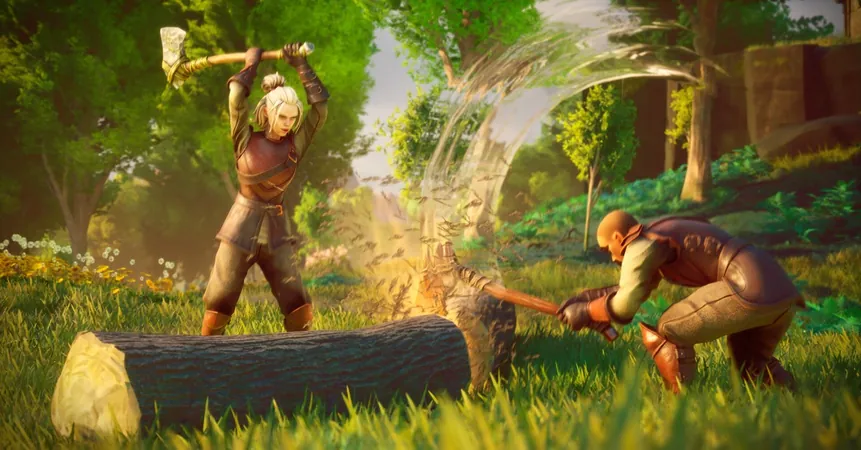
The Great Testosterone Debate: Are We Wired to Be Different?
2025-04-08
Author: Ting
The Great Testosterone Debate: Are We Wired to Be Different?
In an engaging debate that has sparked widespread interest, psychologist Cordelia Fine and evolutionary biologist Carole Hooven tackle the intricate relationship between testosterone and gender behavior. The clash of their ideas centers around a fundamental question: is our biology destined to dictate our behavior, or are societal influences more powerful in shaping what it means to be masculine or feminine?
Cordelia Fine's Perspective
Cordelia Fine takes a holistic approach, positing that gender traits are not merely a product of biological determinism but are significantly influenced by social constructs. She points to the changing dynamics in male-dominated environments, such as offshore oil rigs, to highlight how shifts in workplace culture can transform traditionally masculine behaviors. A case study from the 1980s illustrates this point well—after new policies were implemented to prioritize safety and teamwork, workers began expressing emotions and supporting one another in ways that contradicted their previous macho norms. Fine argues that this cultural alteration suggests testosterone is not the sole driver of male aggression; instead, societal context plays a crucial role.
Carole Hooven's Counterargument
Conversely, Carole Hooven counters Fine's perspective, highlighting that biological factors, including testosterone, are fundamental in establishing certain sex-linked behaviors. While she acknowledges the environmental influences on behavior, Hooven maintains that observable sex differences in aggression and sexual psychology are largely attributable to inherited biological factors. She cites strong examples from animal behaviors, such as male elephant seals that engage in fierce competition for mates, suggesting that higher testosterone levels enhance these instinctive competitive traits.
The Dialogue Intensifies
The dialogue intensifies as both scholars grapple with the implications of their viewpoints. Fine asserts that human beings exhibit greater adaptability than strict biological models allow for, emphasizing our capacity for cultural evolution and social learning that can reshape behaviors traditionally attributed to testosterone. She sees the notion of "Testosterone Rex"—a simplifying idea that testosterone is the primary determinant of masculinity—as an oversimplification that ignores human diversity and culture.
Essentialist Perspective
On the other hand, Hooven defends a more essentialist perspective, arguing that the biological differences inherent in males and females provide a framework that explains many behavioral trends. She argues that the tendency for males to display aggression can be traced back to evolutionary pressures where competition played a vital role in mating success.
A Nuanced Understanding
What emerges from this rich exchange is a nuanced understanding that both biology and culture contribute to the tapestry of gender behavior. While some may argue that evolutionary biology's insights into mating strategies and aggression hold true across animal species, the intricacies of human development cannot be overlooked. Our unique cultural heritage allows for both flexibility and fidelity in expressing gender traits, often making teamwork and emotional intelligence just as valuable as traditionally masculine attributes.
Importance of the Debate
As society strives toward gender equality, this debate holds significant importance. It challenges us to reconsider how much of our identity is written in our biology compared to what can be achieved through social and cultural evolution. Can we reshape our understanding of masculinity and femininity to foster environments where diverse behaviors thrive? This ongoing discussion underscores the essential interconnection between the nature of our biology and the nurture of our environment in defining who we are.
Conclusion
So, are we simply victims of our hormones, or can we redefine masculinity in ways that uplift and empower all? The answer may lie, as these eminent scholars suggest, in a thoughtful examination of both our evolutionary heritage and our rich cultural context.



 Brasil (PT)
Brasil (PT)
 Canada (EN)
Canada (EN)
 Chile (ES)
Chile (ES)
 Česko (CS)
Česko (CS)
 대한민국 (KO)
대한민국 (KO)
 España (ES)
España (ES)
 France (FR)
France (FR)
 Hong Kong (EN)
Hong Kong (EN)
 Italia (IT)
Italia (IT)
 日本 (JA)
日本 (JA)
 Magyarország (HU)
Magyarország (HU)
 Norge (NO)
Norge (NO)
 Polska (PL)
Polska (PL)
 Schweiz (DE)
Schweiz (DE)
 Singapore (EN)
Singapore (EN)
 Sverige (SV)
Sverige (SV)
 Suomi (FI)
Suomi (FI)
 Türkiye (TR)
Türkiye (TR)
 الإمارات العربية المتحدة (AR)
الإمارات العربية المتحدة (AR)